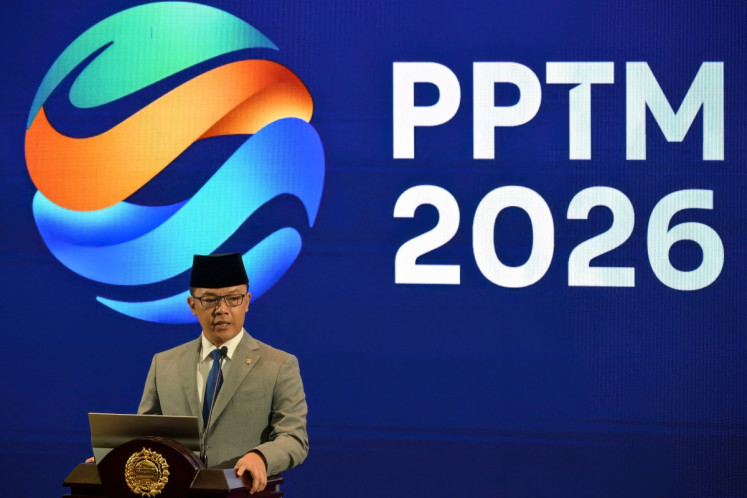Popular Reads
Top Results
Can't find what you're looking for?
View all search resultsPopular Reads
Top Results
Can't find what you're looking for?
View all search resultsThe thirst for positive ‘deviant’ leaders
We are witnessing surprising good news from Jakarta’s gubernatorial election
Change text size
Gift Premium Articles
to Anyone
W
e are witnessing surprising good news from Jakarta’s gubernatorial election. Confounding numerous pre-election polls, quick counts have shown that Surakarta Mayor Joko “Jokowi” Widodo finished ahead of incumbent Governor Fauzi Bowo at the polls on Wednesday.
With neither of Jokowi nor Fauzi winning more than 50 percent of the vote, a runoff scheduled for Sept. 20 will decide the winner.
The race between Jokowi and Fauzi may also be viewed as a contest between major political parties. Jokowi is supported by the Indonesian Democratic Party of Struggle (PDI-P), the third-largest faction at the City Council, with 11 of 94 seats, and the Great Indonesia Movement Party (Gerindra), with six seats. Fauzi was nominated by President Susilo Bambang Yudhoyono’s Democratic Party, the largest faction at the Council with 32 seats, and several smaller parties.
Despite low voter turnout and the need for a runoff election, the results of the quick counts indicate the people’s thirst for positive “deviant” leaders, or leaders who deviate from the common traits and characters shown by the majority of government officials and politicians.
To some extent, Jokowi represents this positive trend. Unlike most government officials and politicians, Jokowi has a good combination of a down-to-earth character and his performance as mayor of Surakarta evinced his ability to listen to the people’s needs and grievances, his capability to set good priorities and the much-needed courage to take risk and important decisions.
Under his leadership, Surakarta experienced significant changes and progress. One of his big achievements was negotiating several meetings with street vendors in Banjarsari and relocating them almost without incident to allow the revitalization of open green land.
Moreover, Jokowi required investors to consider the public interest when doing business in the city and did not hesitate to dismiss those who were against his principles of leadership and the interests of
the people.
Jokowi’s achievements were widely reported by the national and international mass media and even documented by numerous academics and published in several academic and peer-reviewed journals.
Similarly, Jokowi’s running mate, Basuki Tjahaja Purnama, better known as Ahok, can also be categorized as an example of a positive leader with his no nonsense character, clean track record and good performance as the regent of East Belitung.
In addition, the quick counts results showed that Jokowi and Ahok were able to attract voters from outside their political base. This is partly because of their positive character and performance, as well as the fact that their rivals, including the incumbent, do not wield strong influence.
Jokowi’s and Ahok’s down-to-earth persona, their clean track records, their willingness and tireless efforts to meet people from different socioeconomic backgrounds in Jakarta played a crucial role in
attracting voters, including undecided voters.
In contrast to Jokowi, Fauzi was one of the candidates with the least number of public appearances. He also decided to not use his time to meet supporters during the official campaign period, relegating the task to running mate Nachrowi Ramli. This was seen by the people as elitism, arrogance and a reluctance to meet and to listen to the people’s needs and problems — a common characteristic shown by the majority of government officials and politicians.
Finally, the results of the quick counts indicated not just a popular thirst for positive leaders such as Jokowi and Ahok, but also people’s distrust in Fauzi’s capacity and leadership.
The quick counts revealed people’s belief that Jokowi and Ahok were more capable to solve, or at least to reduce, the severity of the daily problems facing the people in Jakarta, including the high rate of unemployment, crime, traffic gridlock, flooding and a lack of public facilities, to name but a few factors.
The writer is a lecturer and researcher at Hasanuddin University, Makassar.










